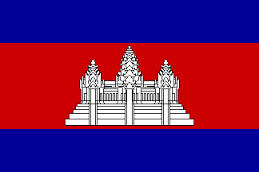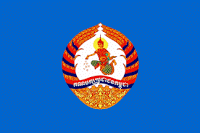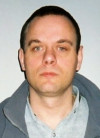So who did win the recent Cambodian National elections? This report just released by Human Rights Watch accuses the ruling government of fraud.
Now lets sit back and wait for the chorus of protests from other ASEAN governments….and wait…and wait.
(New York, July 31, 2013) – The ruling Cambodian People’s Party (CPP) appears to have been involved in electoral fraud in Cambodia’s July 28, 2013 national elections, according to residents and ruling party officials interviewed by Human Rights Watch. All allegations of election fraud and other irregularities, including bias in the election machinery, should be promptly investigated by an independent commission.
The CPP-controlled National Election Commission (NEC) released preliminary results showing that the ruling party won 68 seats and the opposition Cambodian National Reconciliation Party (CNRP) won 55. Based on the same results, the CPP won approximately 49 percent of the national vote, while the CNRP won approximately 44 percent. The opposition has claimed widespread fraud and called for the creation of an independent expert body that includes the United Nations and nongovernmental groups to examine the results and address irregularities.
“Senior ruling party officials appear to have been involved in issuing fake election documents and fraudulently registering voters in multiple provinces,” said Brad Adams, Asia director at Human Rights Watch. “And people from the party seem to have been turning up in places where they clearly don’t live and insisting on voting – not to mention the many other claims of fraud around the country.”
A CPP village chief, who asked for anonymity to protect his security, gave Human Rights Watch an insider’s account of how ruling party authorities in his district engaged in electoral fraud by issuing fraudulent “Identity Certificates for Elections” (ICE) before the July 28 elections. The certificates allow people whose names appear on voter registration lists to vote even though they otherwise lack proper identification documents.
The village chief, whose local CPP superiors worked under instructions from a CPP Center-Level Work Team headed by an army general and a CPP Central Committee member, told Human Rights Watch that his immediate party superiors directly oversaw the illegal issuance of certificates. He explained that a member of the general’s team gave the instructions to issue certificates in the names of villagers who were on the voter registration rolls but were known either to be dead or to have long left their original homes.
The work team member allegedly arranged for soldiers and their wives from an army division stationed in the province to be photographed for certificates. These were then issued by CPP commune and Interior Ministry officials, who allegedly conspired in the scheme to falsely certify these soldiers and their wives as local residents eligible to vote in the commune where these officials were responsible for voter registration. One media report, which is consistent with other accounts, recounted villager descriptions of army-organized voting by thousands of soldiers shipped across provincial boundaries in military vehicles to vote in parts of Siem Reap province where none of them had ever been seen before.
“Issuing hundreds of thousands of fake identity certificates was allegedly one of several key ways the ruling party organized large scale election fraud,” Adams said. “Now, a CPP village chief has confirmed that this happened in his area.”
In another case, villagers in Kandal province, adjacent to the capital, Phnom Penh, described to Human Rights Watch efforts by senior CPP officials to vote in more than one place. When confronted by local residents, the party officials threatened them with arrest and later returned and made death threats.
Numerous residents of Koki Thom commune in Kandal interviewed by Human Rights Watch said that on election day, Ngo Sovan, whose business card states that he is “minister delegate attached to the prime minister” and specifies that he is a secretary of state at the Ministry of Justice, arrived in their commune to vote. He was accompanied by other members of the party’s grassroots strengthening team assigned to the area, as well as by Heng Seksa, whose card says he is a “deputy secretary-general of the Royal Cambodian Government,” and an entourage of dozens of government officials from Phnom Penh.
The villagers protested the group’s attempt to vote there, asserting to local electoral authorities that none of the people were local residents. The local electoral authorities, whom the villagers described as linked to the ruling party, nevertheless allowed the group to cast ballots.
Ngo Sovan’s team included several national level civil servants. According to the national voter registration list compiled from official data on the National Election Committee website and examined by Human Rights Watch, Ngo Sovan was registered to vote in three places. The first (voter registration number R-1424108) is at his known residence in Phnom Penh, where he is a prominent figure and resident, according to local residents Human Rights Watch interviewed.
Ngo Sovan is also registered in the provinces of Kandal (voter registration number R-6132454) and Svay Rieng (voter registration number R-6851267). He heads ruling party election grassroots strengthening or work teams in both provinces. In Kandal, Ngo Sovan also ran as a CPP candidate for the National Assembly.
Heng Seksa, who accompanied Ngo Sovan in Kandal, was registered to vote in both Phnom Penh under voter registration number R-6354916 and Kandal under voter registration number R-6132299, according to official data from the NEC website.
Villagers told Human Rights Watch that members of the entourage threatened them with arrest during the confrontation over whether the group’s members would be allowed to vote. After polls closed, a contingent of “flying tiger” motorcycle police arrived in the area. Villagers told Human Rights Watch that the police said they were looking for “ringleaders” of the “disturbances” that had occurred when the ruling party group’s voter registration was challenged.
The morning after the elections, some members of the group reappeared in the village along with others, including one armed man in civilian clothes, who attempted to identify and apprehend an alleged “ringleader.” Two witnesses told Human Rights Watch that members of the group threatened to kill villagers who refused to provide information on the whereabouts of the alleged ringleader, whom the group also vowed to kill and who has gone into hiding.
“The multiple voting scheme suggests the possibility of systematic election fraud by the CPP and raises serious questions about the credibility of the election,” Adams said. “Since the National Election Committee and local election commissions are under the ruling party’s control, influential governments and donors should demand independent investigations into these and other credible allegations of election related irregularities. Without this, it’s hard to see how Cambodian voters can have confidence in the legitimacy of the elections and the new government that results.”






When the army have guns and are put out on the street they tend to kill people, even or maybe especially journalists. There is rarely any accountability. Quite often it is down to individuals or local officers. Unfortunately the army probably needed to be out on the streets to save places like Central World being burned down. The media cannot stop the army shooting anyone, least of all, the media. Abhisit as the country's leader has to take responsibility, as does Shinawatra for the drugs wars. He made enough speeches on the matter. The circumstances are quite different. The drugs wars was a deliberate purge under which personal scores were settled. Who runs the drugs for heaven's sake?
Abhisit was hardly a dictator. But perhaps not much of a realist either. There are of course mafias in Thailand – but they include not just the army, but police, and politicians. So you do not like HRW because of one man's stance. Their report on the Cambodian elections however has gained credibility from other reports. Not yet including the monitors.
Some rather unfair responses, Andrew, if I may say so. And the "put you down style" is not appropriate on a serious subject.
There is a difference between propaganda and facts. T. was not the only corrupt person in Thailand and to suggest he and he alone was pulling the strings in the drug wars is factually incorrect. Look at some of the academic studies from Western and Thai universities.
I dislike Thaksin's xenophobia but he has done a lot for the Thais if you let the facts and not the propaganda speak.
And you don't really believe MPs expenses are transparent and accountable, do you? They are part of the same hypocrisy we have here.
I'm with Dudeist on most of what he says, and not only for the way he is being attacked..
Err, no, I'm not a "revolutionary" as I'm no longer a teenager.
I believe, some might say naively, in parliamentary democracy.
To attempt to denigrate my comments by comparing me to someone who was clearly mentally ill and on medication is pretty pathetic to be frank. If you can't answer the points I raise without reverting to that same old tired expat line of smearing the commentator you should give up and stay drunk.
The real difference is that the foreign media corps in Bangkok stood by and let the army shoot clearly unarmed civilians on the very streets where that media corps live and then took part in the cover-up.
I note you still haven't answered the substantive points I raised – that HRW in SE Asia are unreliable, are not fact-checked by the foreign media, use unverified tertiary sources that are then quoted as "gold" by the foreign media and all this done whilst the foreign media inexplicably ignore HRW' previous secret support for an illegal, anti-democratic military coup.
Who says the events didn't happen? They certainly did.
And yes the final total is relevant as is who was behind it all.
And to claim it was just "Thaksin" is a complete fabrication and a falsehood.
Abhisit directly signed off on the orders to shoot unarmed civilians when he shouldn't have even been in government. And yes, I think the overarching criminal enterprise in Thailand is not Thaksin, Abhisit or anything else other than the Army.
So, please, before you put words in my mouth you might do well to check your source first rather than just making stuff up.
I think you're having me on now. Hun Sen saved Cambodia from the KR :-). I thought he was a paid up member. As a revolutionary yourself you will realise it won't happen in Thailand unless you get rid of the rich kids. Unless you had not spotted it, Thaksin is a rich kid. And currently the country is being raped at a rate far exceeding previous governments. You remind me about that poor misguided foreigner who wanted to burn down Central. I guess his heart was in the right place, but it was not his fight. MPs expenses were peanuts compared to what happens here. You know it. Good story though and worth doing. It would not be written here though. Get the difference?
I think you are answering your own questions. The army were responsible for Krue Se and Tak Bai but not for the shootings of red shirts in Bangkok? No in that case you will say it was Abhisit for sure. As for the war of drugs I spoke to the families of innocent victims so please do not condescend with this 'not proven' crap. The only thing not proven is where it was 1,800 or 2,500 or whatever. The final total is irrelevant.
"This is to do with people being led to believe they are in revolution only to discover that their Brave New World is worse than the last one. Get a grip."
Errr, as much as might find Hun Sen a nasty piece of work to claim he led a revolution seems weird. He helped throw the KR out. Or are you suggesting that things were better during the KR? Confused.
Drone killings in Pakistan might not matter to you but they probably do to the 1000s of people who've lost their lives.
£50? Ask David Laws MP about that. Basically nicked 10s of £1000s booted out of cabinet just for short period. Now back in.
As for revolutions – who decides what makes up a Thai revolution? Relatively pampered and wealthy Western journalists?
Seems ludicrous to me.
If Thais want a Thaksin-led govt that's up to them, not me.
And, if you're quoting Marx, as you did in another piece on this blog, you'd know he also said the most successful revolutionary class is the bourgeoisie.
Err, yes. That's a statement of fact. The events certainly happened – who was fully responsible never been ascertained.
Krue Se and Tak Bai were largely the work of local senior army officers and came after the intervention of unaccountable elements.
The War on Drugs deaths totals have been questioned at length and never properly substantiated. Also there were others involved whose impunity is well-known.
Believing HRW reports without checking their sources (in their report on the 2010 violence they quoted a "yellow" newspaper which in turn quoted a Thai Army officer, to "prove" the Red Shirts shot first at the army – check their footnotes) is tantamount to believing hearsay.
HRW use secondary and even tertiary sources which they themselves don't fact-check and then journalists regurgitate HRW reports as though they were gospel.
I think you might be confused Dudeist whatever the faults of western governments we do, where you live anyway, require accountability of our elected politicians to such an extent that if they fiddle 50 quid on their expenses they can be f**ked. There is no comparison. This has nought to do with drone killings in Pakistan. This is to do with people being led to believe they are in revolution only to discover that their Brave New World is worse than the last one. Get a grip.
Thaksin's unproven crimes?
Andrew
It's not the comments here that make HRW "bent" in this instance but their own words as found in the Wikileaks cables.
Sunai Phasuk re-iterated his support for the 2006 coup on several occasions in the cables and offered advice to the coup govt. That was not HRW's publicly declared position on the coup which they had supposedly opposed.
Surely, this is not about choosing a side but finding the truth?
HRW in Thailand secretly supported an illegal military coup that overthrew a democratically elected govt and which led to a cycle of instability and violence. That's a disgraceful thing to have done.
HRW don't have to support the govt that was ousted by that coup but it can hardly claim to be in favour of democracy, rule of law etc if supports an illegal coup, enforced by the threat of violence. To then claim "oh, look an election has been fixed" is indicative of their deeply politicised and morally and ethically denuded position in SE Asia.
I guess it might be nice to have a clean government anywhere in the world – you'd be the first to accuse anyone of naivety if they expect Western govts to be the paragon of virtue on that score.
The illegal Iraq invasion, drone killings, the USA's own war on drugs in South America, the illegal bombing of much of SE Asia, the murder of journalists as found in Wikileaks – how does that all stack up against Thaksin's as yet unproven crimes? Should coups, secretly backed by human rights organisations, just happen where and when it suits Western liberals and media?
Undemocratically? I agree if there were a free election in Egypt Morsi would probably not be returned
But polls and political commentators suggest Thailand would return Yingluck.
The opposition parties are bound to disagree but the ballot box is what counts if you believe in democracy whatever your personal views are.
being democratically elected doesn't give you the right to 'rule' undemocratically. just as in Egypt the army had to stop the abuser of the people.
Government in Thailand is not only carried out through the elected government. Any comment on how clean government is should be focused on other parts of the network as well as the actual government. But anyway, that's how the Thais like it. And it's their country not part of the West.
And do banks and big business have more say than elected governments in the West? We are hardly a good role model for developing countries.
HSBC were fined big time in the States for their admitted involvement in money laundering with Afghan warlords involved in drugs. No court appearances. No jail term. Even laughing and joking after coming out of the enquiry, knowing they are stronger tahn elected governments. How many deaths did HSBC effectively cause. Only one newspaper brought that up.
HRW probably had little option but to go along with America's desire for influence in the region. They've done good elsewhere, highlighting abuses but probably had to be pragmatic on the election issue..
Oh dear, what's the world coming to even Human Rights Watch according to the above is bent. I would however find it odd if HRW supported a government which brought Thailand, Tak Bai, Kru Se Mosque, and some 2,500 drug war deaths. It would be so nice to have a clean elected government in Thailand. That may be a dream.
The Cambodian elections is just a regular attack by the International Republican Institute and excepted by the majority of Cambodian NGO's and Western media. Michael Vickery wrote about how biased Brad Adam's was on Cambodia, Asia director of Human Rights Watch. He originally quite ambiguous until the early 2000 and then he started 100% support for the opposition. The Cambodian Daily reported yesterday that Asian international monitors the International Conference of Asian Political Parties (ICAPP) and the Centrist Asia Pacific Democrats International (CAPDI)reported that the elections were fair. However, the same day they reported that independent monitors disputed the elections. I assume this criticism mainly came from the Washington DC based National Democratic Institute, which is very much linked to the International Republican Institute and was accused of conducting the same activities in Venezuela.
The elections were being called unfair and inaccurate about a month prior to the elections before Sam Rainsy even returned to Cambodia, so its only expected they would dispute it. However, what I do find interesting is they left out the normal racist garbage spouted by Sam Rainsy and other opposition leaders, and have only really started mentioning it due to the recent violence.
http://greenanreport.wordpress.com/2013/07/23/cambodias-2013-elections-when-a-democracy-is-not-a-democracy/
http://greenanreport.wordpress.com/2013/07/29/cambodias-post-election-riots/
The elections in Cambodia have just been a long term game on the part of the International Republican Institute and US backed Human Rights Organizations, such as Human Rights Watch to insure US influence in the country. It's just increased this year due to the US pivot. Michael Vickery noted in many of his writings bias on the part of Brad Adams long term Human rights Watch director. Actually the Cambodian Daily reported that the International election monitors reported it as fair http://www.cambodiadaily.com/elections/international-election-observers-proclaim-election-free-fair-37395/?utm_source=rss&utm_medium=rss&utm_campaign=international-election-observers-proclaim-election-free-fair while on the same day independent election monitors (we assume this to be the election monitor group linked to the IRI, which did the same in Venezuela), reported it as unfair http://www.cambodiadaily.com/elections/independent-monitors-say-election-beset-with-irregularities-37391/?utm_source=rss&utm_medium=rss&utm_campaign=independent-monitors-say-election-beset-with-irregularities
I actually wrote a 10,000 word article on the bias approach in the Cambodia elections http://greenanreport.wordpress.com/2013/07/23/cambodias-2013-elections-when-a-democracy-is-not-a-democracy/ while another article I wrote highlights the reasons for the post election riot e.g what happens when you mix racism and nationalism during an election your describing as fixed http://greenanreport.wordpress.com/2013/07/29/cambodias-post-election-riots/
There's a great irony that HRW complain about voter fraud when their Thailand researcher, Sunai Phasuk, was caught in the wikileaks cables not only secretly supporting the 2006 Thai military coup – which overthrew a democratically elected government – but also offered advice to them.
The even greater irony is that not one single Bangkok-based foreign correspondent has ever reported on HRW's very odd behaviour in Thailand despite it staring at them right in the face.
A case of don't bite the hand that feeds? Again?